WF-PST Industry Panel Sessions
Join us for important panel discussions covering vital real-world demands and industry case studies. The panelists, a set of diverse public safety agencies, researchers, industry leaders, and first responders, aim to share their insightful perspectives and engage the broader community in a stimulating dialogue. Examples include how personnel can be more effective in their work, support sustained health and wellness, and learn how technology safeguards our communities. Additional panels will be announced soon.
- Industry Program Chair – Narendra Mangra, GlobeNet LLC
- Industry Program Co-Chair – Ashutosh Dutta, Johns Hopkins University/APL
Panel 1: Threat Detection and Identification (May 14)
Public safety is faced with many threats and requires infrastructure resiliency and scalability to meet dynamic needs, information sharing for situational awareness and decision-making to address risks, and shared responsibilities across geographies and jurisdictions. The ability to detect and identify threats is needed to protect and secure borders, critical infrastructure, cybersecurity environment, agriculture and food, health services, schools, transportation, large gatherings, and events. This panel discussion will address key capabilities and considerations for threat detection and identification.
MODERATOR: Ashutosh Dutta, Ph.D., Senior Scientist/5G Chief Strategist, Director, JHU Doctor of Engineering Program
PANELISTS
-
- Dr. Semih Aslan, Associate Professor of Electrical Engineering, Texas State University
- Dr. Walt Magnussen, Director of the Texas A&M University Internet2 Technology Evaluation Center (ITEC)
- Byron McCray, K-12 School Security Director
- Dr. Danda Rawat, Associate Dean for Research & Graduate Studies, College of Engineering and Architecture, Howard University
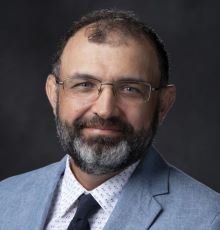 BIO: Dr. Semih Aslan is an Associate Professor of Electrical Engineering at Texas State University, where he joined in 2011. He previously worked as a Senior FPGA Design Engineer with Motorola and full-time instructor at ITT Technical Institute. At ITT Technical Institute, Dr. Aslan worked with minority students as a full-time instructor and assistant dean for over 10 years on the west side of Chicago. Dr. Aslan is the founding director of the System Modeling and Green Technology (SMART) Lab in the Ingram School of Engineering at Texas State. He currently advises graduate and undergraduate senior students on green energy, multi-processor system design and data analysis projects and has numerous publications.
BIO: Dr. Semih Aslan is an Associate Professor of Electrical Engineering at Texas State University, where he joined in 2011. He previously worked as a Senior FPGA Design Engineer with Motorola and full-time instructor at ITT Technical Institute. At ITT Technical Institute, Dr. Aslan worked with minority students as a full-time instructor and assistant dean for over 10 years on the west side of Chicago. Dr. Aslan is the founding director of the System Modeling and Green Technology (SMART) Lab in the Ingram School of Engineering at Texas State. He currently advises graduate and undergraduate senior students on green energy, multi-processor system design and data analysis projects and has numerous publications.
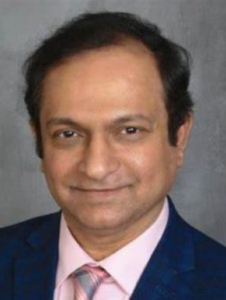 BIO: Ashutosh Dutta is currently Chief 5G Strategist and JHU/APL Sabbatical Fellow at Johns Hopkins University Applied Physics Labs (JHU/APL), USA. He serves as the director of Doctor of Engineering at JHU. Most recently, he was the chair of the Electrical and Computer Engineering for Engineering Professional Program at JHU. His career, spanning more than 30 years, includes Director of Technology Security and Lead Member of Technical Staff at AT&T, CTO of Wireless at a Cybersecurity company NIKSUN, Inc., Senior Scientist in Telcordia Research, Director of Central Research Facility at Columbia University, adjunct faculty at NJIT, and Computer Engineer with TATA Motors.
BIO: Ashutosh Dutta is currently Chief 5G Strategist and JHU/APL Sabbatical Fellow at Johns Hopkins University Applied Physics Labs (JHU/APL), USA. He serves as the director of Doctor of Engineering at JHU. Most recently, he was the chair of the Electrical and Computer Engineering for Engineering Professional Program at JHU. His career, spanning more than 30 years, includes Director of Technology Security and Lead Member of Technical Staff at AT&T, CTO of Wireless at a Cybersecurity company NIKSUN, Inc., Senior Scientist in Telcordia Research, Director of Central Research Facility at Columbia University, adjunct faculty at NJIT, and Computer Engineer with TATA Motors.
Ashutosh is the author of more than 100 technical papers and 31 issued patents. Ashutosh is co-author of the book titled, “Mobility Protocols and Handover Optimization: Design, Evaluation and Application,” published by IEEE and John & Wiley. As a Technical Leader in 5G and security, Ashutosh has been serving as the founding Co-Chair for the IEEE Future Networks Initiative, which focuses on 5G standardization, education, publications, testbed, and roadmap activities. Ashutosh was an IEEE Communications Society’s Distinguished Lecturer for 2017-2020 and an ACM Distinguished Speaker (2020-2022). Ashutosh currently serves as the founding co-chair for the IEEE Future Networks Initiative and is a Member-At-Large for the IEEE Communications Society.
He co-founded the IEEE STEM conference (ISEC) and helped to implement EPICS (Engineering Projects in Community Service) projects in several high schools. Ashutosh has been the general co-chair of the IEEE STEM conference for the last ten years. Ashutosh served as the Director of Industry Outreach for the IEEE Communications Society from 2014-2019. He was the recipient of the 2009 IEEE MGA Leadership Award. Ashutosh is the recipient of IEEE-USA’s 2010 Professional Leadership Award and 2022 IEEE-USA George F. McClure Citation of Honor. He also received the 2022 IEEE North American Region Exceptional Service Award. Ashutosh served as Member-At-Large for the IEEE Communications Society for 2020-2022. Ashutosh has been the founding Co-Chair for the premier IEEE 5G World Forums and has organized 85 5G World Summits worldwide. Ashutosh currently serves as the Chair for IEEE Industry Connection’s O-RAN activities and IPv6.
Ashutosh is a Distinguished Alumnus of NIT Rourkela. He has a B.S. in Electrical Engineering, an M.S. in Computer Science from NJIT, and a Ph.D. in Electrical Engineering from Columbia University under the supervision of Prof. Henning Schulzrinne. He is a Fellow of IEEE and a Distinguished member of ACM.
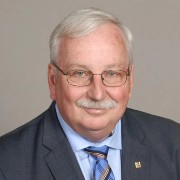 BIO: Dr. Walt Magnussen is the Director of the Texas A&M University Internet2 Technology Evaluation Center (ITEC). He has been directing the center which has a focus on critical communications interoperability for defense and public safety for 20 years. The ITEC work in the NG911, 4G/5G and other critical communications infrastructure and applications space is well known throughout the world.
BIO: Dr. Walt Magnussen is the Director of the Texas A&M University Internet2 Technology Evaluation Center (ITEC). He has been directing the center which has a focus on critical communications interoperability for defense and public safety for 20 years. The ITEC work in the NG911, 4G/5G and other critical communications infrastructure and applications space is well known throughout the world.
Dr. Magnussen has been in the communications industry for over 50 years since he began his career in the Air Force supporting secure voice and data systems. For the past 20 years he has directed the Internet2 Technology Evaluation Center (ITEC) at Texas A&M University. The ITEC is one of the leading public safety and defense interoperability centers in the world working in Next Generation 911, 5G communications, Mission Critical Push-to-talk and several other leading-edge technologies. In January 2024 Dr. Magnussen began his two-year term on the National Spectrum Consortium Executive Committee because of his leadership role in 5G wireless research. Because of his expertise he has been called on to testify before Congress, serve on FCC advisory committees and he currently sits on the DHS Safecom federal advisory committee. Dr. Magnussen has his PH. D from Texas A&M University and his bachelor’s and master’s degrees from the University of Minnesota.
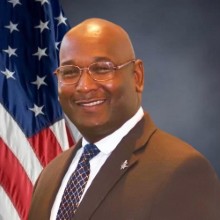 BIO: Byron McCray offers more than thirty years of extensive experience across Public Safety, Law Enforcement, Human Services, and the application of computer technology for school safety enhancement. His distinguished career is highlighted by his service in several key roles, such as Regional Director, Director, Chief, Sergeant, Investigator, and Officer. These roles prominently showcase his exemplary leadership skills.
BIO: Byron McCray offers more than thirty years of extensive experience across Public Safety, Law Enforcement, Human Services, and the application of computer technology for school safety enhancement. His distinguished career is highlighted by his service in several key roles, such as Regional Director, Director, Chief, Sergeant, Investigator, and Officer. These roles prominently showcase his exemplary leadership skills.
McCray’s educational background includes studies at John Jay College, Brooklyn Law School and Elizabeth Haub School of Law at Pace University. His record of achievements is impressive, featuring completion of programs in Diversity, Equity & Inclusion at Cornell University, Mechanical Ventilation at Harvard Medical School, and a substantial amount of Instructor training through the Department of Criminal Justice Services and Homeland Security.
Additionally, McCray is a certified mediator and offers his expertise as an instructor to both New York State and Federal Law Enforcement agencies. His certification not only highlights his profound ability to promote effective communication but also exemplifies his steadfast commitment to ongoing education and professional development.
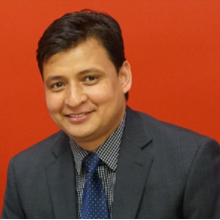 BIO: Dr. Danda B. Rawat is a Full Professor in the Department of Electrical Engineering & Computer Science (EECS), Associate Dean for Research & Graduate Studies (CEA), Founding Director of the Howard University Data Science & Cybersecurity Center, Founding Director of DoD Center of Excellence in Artificial Intelligence & Machine Learning (CoE-AIML), Director of Cyber-security and Wireless Networking Innovations (CWiNs) Research Lab, Director of Trustworthy Artificial Intelligence (TruAI) Research Lab, Graduate Program Director of Howard CS Graduate Programs and Director of Graduate Cybersecurity Certificate Program and led as the Founding Executive Director and PI of the Research Institute for Tactical Autonomy (RITA), the 15th US Department of Defense sponsored University Affiliated Research Center (UARC) focused on Tactical Autonomy at Howard University, Washington, DC, USA. Dr. Rawat is engaged in research and teaching in the areas of cybersecurity, machine learning, big data analytics and wireless networking for emerging networked systems including cyber-physical systems (eHealth, energy, transportation), Internet-of-Things, multi domain operations, smart cities, software defined systems and vehicular networks.
BIO: Dr. Danda B. Rawat is a Full Professor in the Department of Electrical Engineering & Computer Science (EECS), Associate Dean for Research & Graduate Studies (CEA), Founding Director of the Howard University Data Science & Cybersecurity Center, Founding Director of DoD Center of Excellence in Artificial Intelligence & Machine Learning (CoE-AIML), Director of Cyber-security and Wireless Networking Innovations (CWiNs) Research Lab, Director of Trustworthy Artificial Intelligence (TruAI) Research Lab, Graduate Program Director of Howard CS Graduate Programs and Director of Graduate Cybersecurity Certificate Program and led as the Founding Executive Director and PI of the Research Institute for Tactical Autonomy (RITA), the 15th US Department of Defense sponsored University Affiliated Research Center (UARC) focused on Tactical Autonomy at Howard University, Washington, DC, USA. Dr. Rawat is engaged in research and teaching in the areas of cybersecurity, machine learning, big data analytics and wireless networking for emerging networked systems including cyber-physical systems (eHealth, energy, transportation), Internet-of-Things, multi domain operations, smart cities, software defined systems and vehicular networks.
Panel 2: Public Safety Technologies: Needs and Challenges (May 14)
Professionals use technologies to protect our communities from threats that range from manmade to natural disasters. Moderated by Russel Harrison, Managing Director, IEEE USA, the panel will discuss current needs and challenges to using new technologies in the field.
MODERATOR: Russell Harrison, Managing Director of IEEE-USA
PANELISTS
- Michelle K. Donnelly, fire protection engineer at the National Institute of Standards and Technology (NIST)
- Stephanie Layman, UAS Prize Challenge Specialist
- Dr. Jorge Pereira, Principal Scientific Officer, European Commission
BIO: Michelle K. Donnelly is a fire protection engineer at the National Institute of Standards and Technology (NIST). She has been working as a research engineer in NIST’s Fire Research Division for more than 30 years. She is currently a member of the Fire Fighting Technology Group where her focus 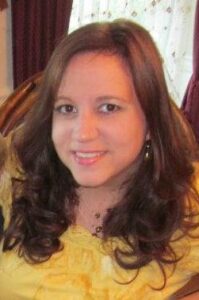 is researching the effects of fire environments on gear and equipment used by First Responders. She is a member of several National Fire Protection Association (NFPA) committees, and results from her investigations have been used to develop and revise NFPA equipment standards. She received the Department of Commerce Bronze Medal Award in recognition of this work. Ms. Donnelly is part of the team investigating the Per- and Polyfluorinated Substances (PFAS) in firefighter gear. She previously worked on NIST’s large scale fire investigations, including the World Trade Center Fire Safety Investigation and the Station Nightclub Fire. Her other research at NIST includes measuring smoke and fire signatures, investigating the flammability of refrigerants, measuring the effectiveness of flame suppressants, conducting vertical wind tunnel tests, and accurately measuring smoke and nanoparticles. Ms. Donnelly has a Bachelor of Science in Mechanical Engineering from the University of Maryland, and a Masters in Mechanical Engineering from the Johns Hopkins University.
is researching the effects of fire environments on gear and equipment used by First Responders. She is a member of several National Fire Protection Association (NFPA) committees, and results from her investigations have been used to develop and revise NFPA equipment standards. She received the Department of Commerce Bronze Medal Award in recognition of this work. Ms. Donnelly is part of the team investigating the Per- and Polyfluorinated Substances (PFAS) in firefighter gear. She previously worked on NIST’s large scale fire investigations, including the World Trade Center Fire Safety Investigation and the Station Nightclub Fire. Her other research at NIST includes measuring smoke and fire signatures, investigating the flammability of refrigerants, measuring the effectiveness of flame suppressants, conducting vertical wind tunnel tests, and accurately measuring smoke and nanoparticles. Ms. Donnelly has a Bachelor of Science in Mechanical Engineering from the University of Maryland, and a Masters in Mechanical Engineering from the Johns Hopkins University.
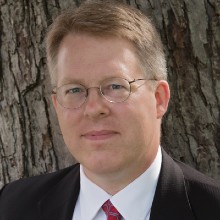 BIO: Russell T. Harrison is IEEE-USA’s director of Government Relations. He previously served as senior legislative representative for grassroots activities. In addition to providing overall strategic direction and day-to-day operational management of IEEE-USA’s government relations program and staff, he also focuses on programs and activities design to help U.S. IEEE members interact with – and influence – elected officials. He is also responsible for a number of IEEE-USA government relations initiatives, particularly small and independent business policy and high-skill immigration reform. Prior to IEEE-USA, Russell directed grassroots programs at the Institute of Scrap Recycling Industries and the American Iron and Steel Institute. In these positions, he also raised over $300,000 in campaign contributions through the associations’ political action committees. He has also represented the recycling and steel industries on Capitol Hill and in state capitols on a variety of issues as a professional lobbyist. Russell has a B.A. in Political Science, with minors in History and Communication, from Allegheny College, and a Masters in Public Policy from the University of Maryland.
BIO: Russell T. Harrison is IEEE-USA’s director of Government Relations. He previously served as senior legislative representative for grassroots activities. In addition to providing overall strategic direction and day-to-day operational management of IEEE-USA’s government relations program and staff, he also focuses on programs and activities design to help U.S. IEEE members interact with – and influence – elected officials. He is also responsible for a number of IEEE-USA government relations initiatives, particularly small and independent business policy and high-skill immigration reform. Prior to IEEE-USA, Russell directed grassroots programs at the Institute of Scrap Recycling Industries and the American Iron and Steel Institute. In these positions, he also raised over $300,000 in campaign contributions through the associations’ political action committees. He has also represented the recycling and steel industries on Capitol Hill and in state capitols on a variety of issues as a professional lobbyist. Russell has a B.A. in Political Science, with minors in History and Communication, from Allegheny College, and a Masters in Public Policy from the University of Maryland.
 BIO: Stephanie Layman joined the National Institute of Standards and Technology (NIST) Public Safety Research Communications Research (PSCR) Division’s Open Innovation (OI) team and Uncrewed Aircraft Systems (UAS) Portfolio in November 2021 as an OI Project Manager and transitioned into her current role, UAS Prize Challenge Specialist, in August 2023. In both roles, she has supported internal and external R&D, communications, legal, administrative, and procurement resources to design and implement prize challenges that advance PSCR’s mission. Prior to PSCR, Stephanie accumulated six years as a contracted project manager and research analyst for federal and local government clients, including NIST PSCR, Department of Energy (DOE), Colorado Energy Office (CEO), Denver International Airport (DIA), Regional Transportation Authority (RTA), and the City and County of Denver. She has additional experience in project management, research, and communications through her time with the United States Peace Corps, Urban Leaders Fellowship, Seoul Metropolitan Government, and LIVESTRONG Foundation. Stephanie holds Project Management Professional (PMP) certification, a Master of Public Affairs degree from the Indiana University School of Public and Environmental Affairs (SPEA), and a Bachelor of Arts degree from the University of Texas at Austin.
BIO: Stephanie Layman joined the National Institute of Standards and Technology (NIST) Public Safety Research Communications Research (PSCR) Division’s Open Innovation (OI) team and Uncrewed Aircraft Systems (UAS) Portfolio in November 2021 as an OI Project Manager and transitioned into her current role, UAS Prize Challenge Specialist, in August 2023. In both roles, she has supported internal and external R&D, communications, legal, administrative, and procurement resources to design and implement prize challenges that advance PSCR’s mission. Prior to PSCR, Stephanie accumulated six years as a contracted project manager and research analyst for federal and local government clients, including NIST PSCR, Department of Energy (DOE), Colorado Energy Office (CEO), Denver International Airport (DIA), Regional Transportation Authority (RTA), and the City and County of Denver. She has additional experience in project management, research, and communications through her time with the United States Peace Corps, Urban Leaders Fellowship, Seoul Metropolitan Government, and LIVESTRONG Foundation. Stephanie holds Project Management Professional (PMP) certification, a Master of Public Affairs degree from the Indiana University School of Public and Environmental Affairs (SPEA), and a Bachelor of Arts degree from the University of Texas at Austin.
 BIO: Dr. Jorge Pereira – Between 1983 and 1988, he taught in the Department of Electrical and Computer Engineering of IST as Full Lecturer in the areas of Electrotechnics and Electrical Measurements, Applied Electronics and Telecommunication Systems, and became Assistant Professor in 1994.
BIO: Dr. Jorge Pereira – Between 1983 and 1988, he taught in the Department of Electrical and Computer Engineering of IST as Full Lecturer in the areas of Electrotechnics and Electrical Measurements, Applied Electronics and Telecommunication Systems, and became Assistant Professor in 1994.
In the period 1993-96, he worked at GTE Laboratories Inc., Waltham, MA, where he was responsible for the Communication Analysis and Simulation aspects of the National ITS Architecture contract with the Federal Highway Administration, leading a team involving major companies across the US (Rockwell International, Apogee Research, Honeywell, George Mason University, Loral Federal Systems, and Caltrans). One of the particular areas of interest was Emergency vehicles and HAZMAT, Wide Area Alerts and what came to be known as Disaster Response and Evacuation, with the associated stringent communication requirements.
He was also involved in Wireless Data performance assessment and optimization, and Internet traffic characterization. He was also involved in the first CDPD trials in the San Francisco Bay Area, involving location-based applications. At the time of the first E-991 mandate, he was involved in the interaction with the FCC concerning the “definition” of accuracy and the associated requirements.
Until August 1996, he was the GTE representative to the Telecommunications Industry Association (TIA) ITS Section, and to the CDMA Development Group (CDG) in charge of High-Speed Data Systems.
Dr. Pereira has been with the European Commission since September 1996, becoming Principal Scientific Officer in 2005. He has been dealing with ICT, covering a broad variety of areas, with a focus on networking, devices, applications and services, testing and validation, as well as deployment. He moved in 2016 to the area of Future Connectivity Systems, focusing on 5G and beyond. He is responsible for the areas of advanced spectrum management; optical-wireless convergence; network applications; Connected and Automated Mobility (CAM); Public Protection and Disaster Relief (PPDR); and sustainability.
He is a Member of the IEEE, where he is Associate Editor for Mobile Radio, including Vehicular Communications, for the IEEE VTS Magazine, and a member of the IEEE Future Networks Summit Steering Committee of the IEEE Communications Society, responsible for CAM and PPDR. He also served as Associate Editor of the ACM Transactions on Sensor Networks.
He received the Industry Achievement Award of the Software-Defined Radio (SDR) Forum in 2003, in recognition of his “outstanding contributions, research and development in the field of SDR”.
Panel 3: Increased Awareness and Readiness Levels
Public safety requires increased awareness and readiness capabilities to avoid, prevent or stop imminent threats. These capabilities require an integrated approach to planning, public information and warning systems, coordinated operations, forensics and attribution, shared information, interdiction and disruption, and active and passive surveillance. It is essential to develop engaged partnerships through a whole community approach, scalability, flexibility, adaptability, and the readiness to act. The ability for increased awareness and readiness is essential to prevent chemical, biological, radiological, nuclear, and explosive (CBRNE) threats; cybersecurity threats; attacks on the electrical grid; biological terrorism; chemical and biological food contamination; and much more. This panel discussion will address key capabilities and considerations for increased awareness and readiness levels.
MODERATOR: Timothy Lee, Boeing Technical Fellow
PANELISTS
-
- Eman Hammad, Assistant Professor, Texas A&M University
- Luis Kun, (2023-2024) IEEE President of the Society on Social Implications of Technology and a Distinguished Professor Emeritus (CHDS/NDU)
- Robert Osgood, Director, Computer Forensics, Associate Professor, Electrical and Computer Engineering, Volgenau, George Mason University
- Anjuli “A.J.” Renold, Senior Associate Director, Internet2 Technology Evaluation Center (ITEC)
 BIO: Dr. Eman Hammad is a cybersecurity & interdisciplinary professional who has her PhD in Electrical & Computer Engineering from the University of Toronto. Her research focuses on the cyber-physical security and resilience of smart power systems. Dr. Hammad investigates how a deeper understanding of interactions between critical infrastructure systems and enabling technologies can help design new classes of operational solutions that are more resilient and secure by design. Her research interests include cyber-physical security, resilient autonomous systems, operational trust and risk-aware coordination. She is the director of the innovations in Systems’ Trust & Resilience (iSTAR) lab. Dr. Hammad’s research has been published in more than 70 papers and has been recognized with merit awards (Best Paper Award, Best Poster Awards). Most recently, she was honored as one of Canada’s Top 20 Women in Cybersecurity. Dr. Hammad is a senior IEEE member serving as the co-chair of the IEEE Future Networks Security working group for the International Network Generations Roadmap (INGR). She is regularly invited to deliver keynote talks and presentations. She is an active advocate for diversity and inclusion in STEM, power, and Cybersecurity.
BIO: Dr. Eman Hammad is a cybersecurity & interdisciplinary professional who has her PhD in Electrical & Computer Engineering from the University of Toronto. Her research focuses on the cyber-physical security and resilience of smart power systems. Dr. Hammad investigates how a deeper understanding of interactions between critical infrastructure systems and enabling technologies can help design new classes of operational solutions that are more resilient and secure by design. Her research interests include cyber-physical security, resilient autonomous systems, operational trust and risk-aware coordination. She is the director of the innovations in Systems’ Trust & Resilience (iSTAR) lab. Dr. Hammad’s research has been published in more than 70 papers and has been recognized with merit awards (Best Paper Award, Best Poster Awards). Most recently, she was honored as one of Canada’s Top 20 Women in Cybersecurity. Dr. Hammad is a senior IEEE member serving as the co-chair of the IEEE Future Networks Security working group for the International Network Generations Roadmap (INGR). She is regularly invited to deliver keynote talks and presentations. She is an active advocate for diversity and inclusion in STEM, power, and Cybersecurity.
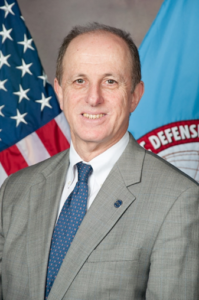 BIO: Luis Kun is the (2023-2024) IEEE President of the Society on Social Implications of Technology and a Distinguished Professor Emeritus (CHDS/NDU) and ADCOM member of EMBS. Born in Montevideo, graduated from the Merchant Marine Academy in Uruguay and holds a BSEE, MSEE, and PhD degree in BME, all from UCLA. He is an IEEE Life Fellow, a Fellow of the: American Institute for Medical and Biological Engineering, the International Academy of Medical and Biological Engineering, and the International Union for Physical and Engineering Sciences in Medicine. Founding EIC of Springer’s Journal of Health and Technology. Spent 14 years at IBM and was the Director of Medical Systems Technology at Cedars Sinai Medical Center. Developed the first 6 healthcare applications for the IBM PC. As Senior IT Advisor to AHCPR, he formulated the IT vision and was the lead staff for HPCC and Telehealth. July 1997 invited speaker to the White House, largely responsible for the first Telemedicine Homecare Legislation signed by President Clinton, August 1997. Distinguished Fellow at the CDC, Acting Chief IT Officer for the National Immunization Program, formulated their IT vision on 10/2000. In 2002 he developed and taught the courses of Knowledge Management and AI in Public Health for the Public Health Informatics curricula at the Rollins School of Public Health at Emory University. Dr. Kun received many awards including: AIMBE’s first-ever Fellow Advocate Award in 2009; IEEE-USA Citation of Honor Award: “For exemplary contributions in the inception and implementation of a health care IT vision in the US.” Named “Profesor Honoris Causa” by Favaloro University, (Argentina) 2009 and “Distinguished Visitor” by the City of Puebla, Mexico, 2013. Since 2003, served as an IEEE Distinguished Visitor for Computers, Distinguished Lecturer (DL) for EMBS and SSIT where he chairs the DL Program since 2016.
BIO: Luis Kun is the (2023-2024) IEEE President of the Society on Social Implications of Technology and a Distinguished Professor Emeritus (CHDS/NDU) and ADCOM member of EMBS. Born in Montevideo, graduated from the Merchant Marine Academy in Uruguay and holds a BSEE, MSEE, and PhD degree in BME, all from UCLA. He is an IEEE Life Fellow, a Fellow of the: American Institute for Medical and Biological Engineering, the International Academy of Medical and Biological Engineering, and the International Union for Physical and Engineering Sciences in Medicine. Founding EIC of Springer’s Journal of Health and Technology. Spent 14 years at IBM and was the Director of Medical Systems Technology at Cedars Sinai Medical Center. Developed the first 6 healthcare applications for the IBM PC. As Senior IT Advisor to AHCPR, he formulated the IT vision and was the lead staff for HPCC and Telehealth. July 1997 invited speaker to the White House, largely responsible for the first Telemedicine Homecare Legislation signed by President Clinton, August 1997. Distinguished Fellow at the CDC, Acting Chief IT Officer for the National Immunization Program, formulated their IT vision on 10/2000. In 2002 he developed and taught the courses of Knowledge Management and AI in Public Health for the Public Health Informatics curricula at the Rollins School of Public Health at Emory University. Dr. Kun received many awards including: AIMBE’s first-ever Fellow Advocate Award in 2009; IEEE-USA Citation of Honor Award: “For exemplary contributions in the inception and implementation of a health care IT vision in the US.” Named “Profesor Honoris Causa” by Favaloro University, (Argentina) 2009 and “Distinguished Visitor” by the City of Puebla, Mexico, 2013. Since 2003, served as an IEEE Distinguished Visitor for Computers, Distinguished Lecturer (DL) for EMBS and SSIT where he chairs the DL Program since 2016.
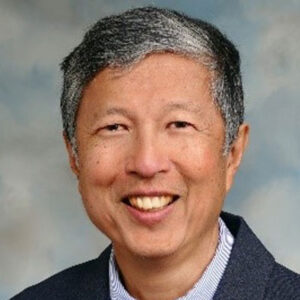 BIO: Timothy Lee, a Boeing Technical Fellow based in Southern CA, leads the development of disruptive microelectronics technologies for advanced communications networks and sensor systems for airborne and space applications. His current research interests include silicon Application Specific Integrated Circuits (ASICs), gallium nitride Monolithic Microwave Integrated Circuits (MMICs), and 3DIC technologies for vertical integration of digital Si chiplets and analog/RF devices. He led the development of hardware for satellite communications and has built phased-array antenna electronics for commercial and US government customers.
BIO: Timothy Lee, a Boeing Technical Fellow based in Southern CA, leads the development of disruptive microelectronics technologies for advanced communications networks and sensor systems for airborne and space applications. His current research interests include silicon Application Specific Integrated Circuits (ASICs), gallium nitride Monolithic Microwave Integrated Circuits (MMICs), and 3DIC technologies for vertical integration of digital Si chiplets and analog/RF devices. He led the development of hardware for satellite communications and has built phased-array antenna electronics for commercial and US government customers.
He is an active volunteer in the IEEE. He is the 2024 IEEE-USA President-Elect and is seeking collaboration on semiconductor WFD. He leads several Technical Working Groups in the IEEE Heterogeneous Integration Roadmap (HIR) and the IEEE Future Networks Technical Community. He is a member of the IEEE Humanitarian Technology Board Events Committee and the IEEE TAB Adhoc on Data Strategies. Previous roles include membership in the IEEE Board of Directors (2021-2022) and past president of the IEEE Microwave Theory and Technology Society (MTT-S).
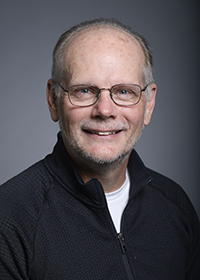 BIO: Robert Osgood (Bob), engineer/C.P.A., is a 26-year veteran FBI Computer Forensics Examiner and Technically Trained Special Agent. His specialties include digital forensics, data intercept, cyber-crime, enterprise criminal organizations, espionage, and counter-terrorism. In the course of his work, he has performed digital forensics research and development and created unique new software tools for computer forensic law enforcement. He has also been employed as Project Director for ManTech International Corp. working in the Computer Forensic Intrusion Analysis Division. He formed the first FBI computer forensics squad in 2000, served as the Chief of the FBI’s Digital Media Exploitation Unit, and was part of the team that executed the first court-authorized digital computer intercept. Mr. Osgood managed and deployed the Washington D. C. gunshot detection system.
BIO: Robert Osgood (Bob), engineer/C.P.A., is a 26-year veteran FBI Computer Forensics Examiner and Technically Trained Special Agent. His specialties include digital forensics, data intercept, cyber-crime, enterprise criminal organizations, espionage, and counter-terrorism. In the course of his work, he has performed digital forensics research and development and created unique new software tools for computer forensic law enforcement. He has also been employed as Project Director for ManTech International Corp. working in the Computer Forensic Intrusion Analysis Division. He formed the first FBI computer forensics squad in 2000, served as the Chief of the FBI’s Digital Media Exploitation Unit, and was part of the team that executed the first court-authorized digital computer intercept. Mr. Osgood managed and deployed the Washington D. C. gunshot detection system.
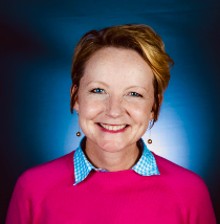 BIO: Anjuli “A.J.” Renold leads administrative functions of the Internet2 Technology Evaluation Center (ITEC) including management of the center’s research portfolio and private contracts. ITEC performs and supports applied research focused on wireless and next generation communications systems for public safety, defense, and critical infrastructure. The primary focus of these efforts is connectivity, interoperability and cybersecurity during emergencies and disasters. With extensive experience as a former executive director for esteemed organizations like the American Red Cross and Court Appointed Special Advocates, Renold has a proven ability to lead transformative change and foster organizational growth.
BIO: Anjuli “A.J.” Renold leads administrative functions of the Internet2 Technology Evaluation Center (ITEC) including management of the center’s research portfolio and private contracts. ITEC performs and supports applied research focused on wireless and next generation communications systems for public safety, defense, and critical infrastructure. The primary focus of these efforts is connectivity, interoperability and cybersecurity during emergencies and disasters. With extensive experience as a former executive director for esteemed organizations like the American Red Cross and Court Appointed Special Advocates, Renold has a proven ability to lead transformative change and foster organizational growth.
During her tenure as chief administrative officer of Voices for Children, CASA (Court Appointed Special Advocates) of Brazos Valley Inc., Renold effectively managed diverse federal, state, and private grants. She employed data-driven program evaluation strategies to ensure the seamless delivery of exceptional services and upheld unwavering quality standards. Renold also actively advocated for essential reforms in child welfare as a member of the Leadership Council for National CASA. Prior to joining ITEC, Renold most recently held the position of Executive Director of the American Red Cross Heart of Texas Chapter, overseeing the operations for a 17-county region and often deploying to national disasters to provide humanitarian aid and logistical coordination with partner agencies.
Renold continues to serve as an American Red Cross volunteer member of the National Elected Official Liaison Network and State Disaster Relations team and lead for local government operations, highlighting her dedication to public service. Renold is a graduate of Texas A&M University and holds a Master of Journalism degree from the Mayborn Graduate Institute of Journalism at the University of North Texas.
Panel 4: Global Priorities, Challenges, and Opportunities
Public safety or public protection and disaster recovery (PPDR) plays a vital role in preserving life, health, and property against adverse events across the globe. Public safety functions include the need for increased awareness and readiness, threat detection and identification, improved situational awareness and decision-making capabilities, tactical and emergency support functions, and recovery support functions.
This panel discussion will address global public safety priorities, challenges, and opportunities to address the dynamic public safety landscape across geographic, social, environmental, and technological areas.
MODERATOR: Mehmet Ulema, PhD, professor of Computer Information Systems at Manhattan College, New York
PANELISTS,
- Anne Cohen PhD, Tenured Scientist, Woods Hole Oceanographic Institution
- Prof Latif Ladid, Founder & President, IPv6 FORUM www.ip6forum.org
- Dr. Jonathan Pan, Chief, Disruptive Technologies Office, and Director, xCybersecurity, Enterprise Group, Home Team Science and Technology Agency (HTX), Singapore
- Charlotte Roesener PhD, Frequentis AG
- Sridhar Kowdley, Technical Manager, U.S. Department of Homeland Security (DHS) Science and Technology Directorate Office for Interoperability and Compatibility Technology Center
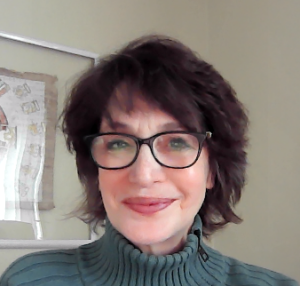 BIO: Anne Cohen PhD, leader, and innovator of DigitalReefTM, is a tenured scientist at the Woods Hole Oceanographic Institution, faculty in the MIT-WHOI Joint Graduate Program in Oceanography, and author of more than 100 scientific papers on climate change and coral reef ecosystems. She served as Expert Witness to the US House of Representatives, on the Science Steering Committee for the Intergovernmental Panel on Climate Change (IPCC), and on NOAA’s Science Advisory Board Working Group for Ecosystem Sciences and Management. She represented the US State Department at the Our Oceans Conference in Chile, addressed the UN General Assembly in New York City, and the Polynesian Leaders Group in Funafuti, Tuvalu.
BIO: Anne Cohen PhD, leader, and innovator of DigitalReefTM, is a tenured scientist at the Woods Hole Oceanographic Institution, faculty in the MIT-WHOI Joint Graduate Program in Oceanography, and author of more than 100 scientific papers on climate change and coral reef ecosystems. She served as Expert Witness to the US House of Representatives, on the Science Steering Committee for the Intergovernmental Panel on Climate Change (IPCC), and on NOAA’s Science Advisory Board Working Group for Ecosystem Sciences and Management. She represented the US State Department at the Our Oceans Conference in Chile, addressed the UN General Assembly in New York City, and the Polynesian Leaders Group in Funafuti, Tuvalu.
Dr Cohen holds the Oliver Davies medal for outstanding scientific contributions, was named Coral Champion by the Lewis Pugh Foundation, and was featured in ECO Magazine’s Top Coral Reef Researchers. Her new initiative, Digital Reefs, utilizes Digital Twin technology to transform ocean ecosystem management and sustainability by putting intuitive, immersive, actionable data and tools into the hands of decision-makers.
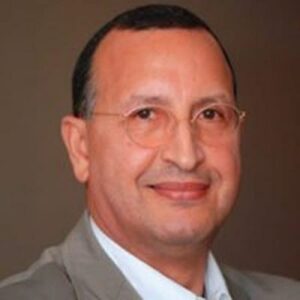 BIO: Prof Latif Ladid holds the following positions:
BIO: Prof Latif Ladid holds the following positions:
Founder & President, IPv6 FORUM www.ip6forum.org
Emeritus Trustee, Internet Society www.isoc.org.
Founding co-Chair, IEEE Future Networks World Forum 2024 https://fnwf2024.ieee.org/
Board Member IPv6 Ready & Enabled Logos Program https://www.ipv6ready.org/
Member of 3GPP PCG (Board) (www.3gpp.org), 3GPP2 PCG (www.3gpp2.org).
Former co-Chair, IEEE Blockchain World Forum
Former Chair, IEEE IoT World Forum
Former Chair, ETSI IPv6 Industry Specification Group : https://portal.etsi.org/tb.aspx?tbid=827&SubTB=827.
Former Founder of the EU Pubic Safety Forum from an EU Project called u2020.
Former Board Member World Summit Award www.wsis-award.org.
Former Member of UN Strategy Council Member of Future Internet Forum EU Member States (representing Luxembourg).
Former Research Fellow @ University of Luxembourg ( since 2006) on multiple European Commission Next Generation Technologies Projects.
IPv6 Forum Internet Pioneer Award, 2002, IPv6 Life Time Achievement Award, 2016.
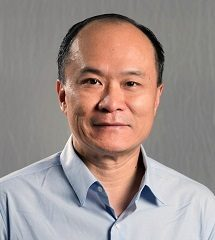 BIO: Jonathan Pan leads the Disruptive Technologies Office of the Home Team Science and Technology Agency (HTX), Singapore. This office explores the frontiers of Science and Technologies, like Artificial Intelligence and Quantum, for homeland security application through their applied Research and Development endeavors. He also concurrently leads the cybersecurity team in HTX. Jonathan conducts his own research in Artificial Intelligence & Cyber Security. He is also an Adjunct Associate Professor with Nanyang Technological University Singapore where he teaches Cyber Security and Artificial Intelligence courses.
BIO: Jonathan Pan leads the Disruptive Technologies Office of the Home Team Science and Technology Agency (HTX), Singapore. This office explores the frontiers of Science and Technologies, like Artificial Intelligence and Quantum, for homeland security application through their applied Research and Development endeavors. He also concurrently leads the cybersecurity team in HTX. Jonathan conducts his own research in Artificial Intelligence & Cyber Security. He is also an Adjunct Associate Professor with Nanyang Technological University Singapore where he teaches Cyber Security and Artificial Intelligence courses.
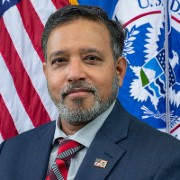 BIO: Sridhar Kowdley is a Technical Manager at the U.S. Department of Homeland Security (DHS) Science and Technology Directorate Office for Interoperability and Compatibility Technology Center. With over 30 years of experience in communications and networking, he works and leads programs to help DHS Components as well as state and local first responders operate more effectively and safely through the pursuit of resilient, highly available and interoperable technology solutions. He forges and leads intra- and interdepartmental partnerships with other agencies including DoD, DoT, NSF, and DoJ.
BIO: Sridhar Kowdley is a Technical Manager at the U.S. Department of Homeland Security (DHS) Science and Technology Directorate Office for Interoperability and Compatibility Technology Center. With over 30 years of experience in communications and networking, he works and leads programs to help DHS Components as well as state and local first responders operate more effectively and safely through the pursuit of resilient, highly available and interoperable technology solutions. He forges and leads intra- and interdepartmental partnerships with other agencies including DoD, DoT, NSF, and DoJ.
At DHS he leads several programs including the P25 Compliance Assessment Program which ensures that radios and solutions manufactured for public safety and federal agencies are built to standards and interoperable. In partnership with industry, public safety practitioners and standards development organizations, DHS provides policy and guidance to enable procurement of land mobile radio solutions by public safety practitioners. He provides technical leadership and guidance for the NG911 Interoperability and Compliance Program designed to ensure that NG911 solutions built by industry will be evaluated for compliance to standards and demonstrated interoperability. This engagement includes industry, academia, public safety practitioners and associations. federal agencies and partnership to ensure that NG911 are tested for nationwide deployment.
Mr. Kowdley supports the research, development, and test and evaluation of next generation communications technologies including 5G/XG, Internet of Things (IoT), and Smart Cities to identify opportunities, risks and vulnerabilities for DHS Components and state and local first responders. He contributes to the research activities across DHS to address capability gaps and vulnerabilities in these technology areas. Currently, he leads initiatives across DHS to make communications networks and systems more resilient to cybersecurity risks including spectrum interference.
Prior to DHS S&T, he supported the modernization of radios systems for CBP to include analysis for early adoption of next generation broadband systems. He led teams supporting the DHS CIO’s Joint wireless Divisions to support spectrum needs for DHS components including leading initiatives for clearing DHS spectrum as a result of C Block spectrum auctions. For commercial operators, he led the development, migration, transitioning and deployment of cellular networks from 2G to 3G including support for a major carriers technology evolution. He also supported the development, deployment and testing and evaluation of commercial and military systems such as IRIDIUM and MILSTAR. He holds a BS in Electrical Engineering from Columbia University NYC and an MS in Electrical and Computer engineering from George Mason University.
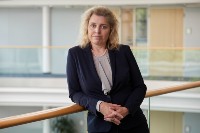 BIO: Charlotte Roesener (PhD) was born in Vienna in 1977. After graduation from Vienna University of Technology / Austria and Keio University / Japan in the field of AI in 2007, Charlotte was at first active in research. Transferring into industry, Charlotte was product manager and technical team leader in public transport. Since 2013, she has been with Frequentis AG, where she has been driving critical communication applications in the public safety domain and is currently Head of Mission Critical Services. Charlotte has been active in the public safety domain for more than eight years, driving innovation but also focusing on building resilient and sustainable solutions for the specific demands in Public Safety, especially on the European market. In recent years, Charlotte has also been participating in and contributing actively to diverse TCCA and GCF working groups. Charlotte has been a Board Member of PSCE (Public Safety Communication Europe) since 2021. Charlotte was appointment as President for the period of one year since June 2023. In her role as President, she is a strong supporter in shaping the research and development of critical communication systems that are crucial for our safety-critical customers.
BIO: Charlotte Roesener (PhD) was born in Vienna in 1977. After graduation from Vienna University of Technology / Austria and Keio University / Japan in the field of AI in 2007, Charlotte was at first active in research. Transferring into industry, Charlotte was product manager and technical team leader in public transport. Since 2013, she has been with Frequentis AG, where she has been driving critical communication applications in the public safety domain and is currently Head of Mission Critical Services. Charlotte has been active in the public safety domain for more than eight years, driving innovation but also focusing on building resilient and sustainable solutions for the specific demands in Public Safety, especially on the European market. In recent years, Charlotte has also been participating in and contributing actively to diverse TCCA and GCF working groups. Charlotte has been a Board Member of PSCE (Public Safety Communication Europe) since 2021. Charlotte was appointment as President for the period of one year since June 2023. In her role as President, she is a strong supporter in shaping the research and development of critical communication systems that are crucial for our safety-critical customers.
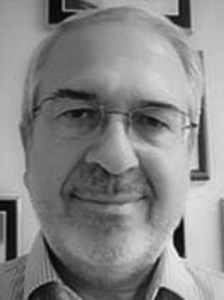 BIO: Professor Ulema has collectively over 40 years of telecommunications experience as a researcher, professor, director, systems engineer, and project manager within the field. Professor Ulema holds two patents. Previously, he held management and technical positions in AT&T Bell Laboratories, Bellcore, Daewoo Telecom, and Hazeltine Corporations.
BIO: Professor Ulema has collectively over 40 years of telecommunications experience as a researcher, professor, director, systems engineer, and project manager within the field. Professor Ulema holds two patents. Previously, he held management and technical positions in AT&T Bell Laboratories, Bellcore, Daewoo Telecom, and Hazeltine Corporations.
Panel 5: Situational Awareness and Emergency Response
Public safety benefits from technologies and processes that reduce the impact of adverse events affecting life, health, and property. Improved situational awareness enables better decision-making capabilities and may help to Identify and mitigate risks and issues from environmental, technological, accidental, or other sources. Contextual communication information for situational improvement and emergency response includes geographical information services, and dynamic environmental conditions through permanent, temporary, and portable communication tools. Robust voice, data, and video communications are essential. This panel discussion will address key capabilities and considerations on the potential for improved situational awareness, enhanced decision-making, and emergency response capabilities.
MODERATOR: Narendra Mangra, Principal at GlobeNet LLC
PANELISTS
- Eliot Christian, Consultant, Filtered Alert Hub initiative Lead, on behalf of the U.S. NOAA, and Common Alerting Protocol (CAP)
- Deepak Kataria, Principal Solution Consultant for Ericsson
- Jes Kiran, Chief Software Architect for High Availability and Disaster Recovery Technologies on Power Systems, IBM.
- Grayson Randall, IEEE MOVE Operations Lead and Chief Technology Officer of Ascot Technologies, Inc.
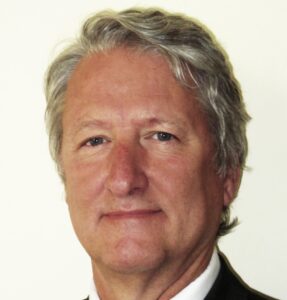 BIO: Eliot Christian is a pro bono consultant to various organizations. He leads the Filtered Alert Hub initiative on behalf of the U.S. NOAA. He consults on the international standard Common Alerting Protocol (CAP), which he helped create. Eliot conducts CAP training for the International Federation of Red Cross and Red Crescent Societies (IFRC), the International Telecommunication Union (ITU), the United Nations Office for Disaster Risk Reduction (UNDRR), the US Agency for International Development (USAID), the World Broadcasting Unions (WBU), and the World Meteorological Organization (WMO). He is retired from WMO, where he was a chief architect of the WMO Information System and the Global Earth Observations System of Systems (GEOSS). Eliot is also retired from the United States Geological Survey (USGS) where for many years he helped lead broad programs for environmental data sharing. Eliot is also CEO of the non-profit Alert-Hub.Org CIC (Community Interest Company).
BIO: Eliot Christian is a pro bono consultant to various organizations. He leads the Filtered Alert Hub initiative on behalf of the U.S. NOAA. He consults on the international standard Common Alerting Protocol (CAP), which he helped create. Eliot conducts CAP training for the International Federation of Red Cross and Red Crescent Societies (IFRC), the International Telecommunication Union (ITU), the United Nations Office for Disaster Risk Reduction (UNDRR), the US Agency for International Development (USAID), the World Broadcasting Unions (WBU), and the World Meteorological Organization (WMO). He is retired from WMO, where he was a chief architect of the WMO Information System and the Global Earth Observations System of Systems (GEOSS). Eliot is also retired from the United States Geological Survey (USGS) where for many years he helped lead broad programs for environmental data sharing. Eliot is also CEO of the non-profit Alert-Hub.Org CIC (Community Interest Company).
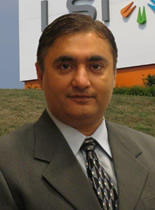 BIO: Deepak Kataria has over 25 years’ experience in telco, data networking, and cloud computing domains with the unique distinction of working in technical leadership roles at AT&T Bell Labs, Lucent Technologies, Fujitsu, Agere Systems, and LSI. He co-founded IPJunction Inc in 2009 consulting telco clients on new solution opportunities, target markets, product management consulting and ecosystem partnerships. Currently, he serves as the Principal Solution Consultant for Ericsson working on AT&T’s cloud native network transformation and Cloud RAN projects. He also co-leads a working group on 5G in verticals and enterprises covering public safety. He served as Chair of IEEE Princeton Central Jersey Section from 2020- 2022, General Chair of IEEE Sarnoff Symposium between 2015-2019 and co-leads the IEEE Future Network Initiative’s Working Group on AI/ML. He holds B.S. in Electronics and Communications Engineering, and pursued M.S. and Ph.D. degrees in Electrical Engineering from Rutgers University, New Jersey. He completed Harvard’s Emerging Leaders professional program on virtual leadership covering strategy, customer focus, corporate governance, and innovation.
BIO: Deepak Kataria has over 25 years’ experience in telco, data networking, and cloud computing domains with the unique distinction of working in technical leadership roles at AT&T Bell Labs, Lucent Technologies, Fujitsu, Agere Systems, and LSI. He co-founded IPJunction Inc in 2009 consulting telco clients on new solution opportunities, target markets, product management consulting and ecosystem partnerships. Currently, he serves as the Principal Solution Consultant for Ericsson working on AT&T’s cloud native network transformation and Cloud RAN projects. He also co-leads a working group on 5G in verticals and enterprises covering public safety. He served as Chair of IEEE Princeton Central Jersey Section from 2020- 2022, General Chair of IEEE Sarnoff Symposium between 2015-2019 and co-leads the IEEE Future Network Initiative’s Working Group on AI/ML. He holds B.S. in Electronics and Communications Engineering, and pursued M.S. and Ph.D. degrees in Electrical Engineering from Rutgers University, New Jersey. He completed Harvard’s Emerging Leaders professional program on virtual leadership covering strategy, customer focus, corporate governance, and innovation.
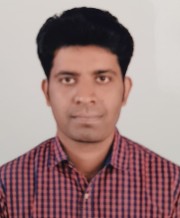 BIO: Jes Kiran is the Chief Software Architect for High Availability and Disaster Recovery Technologies on Power Systems at IBM. He has 20+ years of IT experience and expertise in HA/DR, Clustering, Cloud, Docker, and Storage replication technologies. He is an IBM Master Inventor with 20+ patents and papers. He is also Chair of IEEE group -“Disaster Recovery for Enterprise Blockchain Workloads” and Chair of the Association of Enterprise Architects, Hyderabad chapter.
BIO: Jes Kiran is the Chief Software Architect for High Availability and Disaster Recovery Technologies on Power Systems at IBM. He has 20+ years of IT experience and expertise in HA/DR, Clustering, Cloud, Docker, and Storage replication technologies. He is an IBM Master Inventor with 20+ patents and papers. He is also Chair of IEEE group -“Disaster Recovery for Enterprise Blockchain Workloads” and Chair of the Association of Enterprise Architects, Hyderabad chapter.
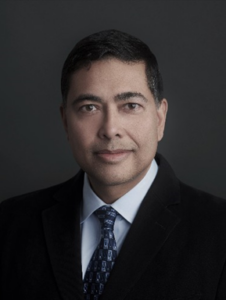 BIO: Narendra Mangra provides advisory and consulting services across industry, government, and academia at GlobeNet LLC. His experience spans technical and leadership roles across the end-to-end mobile ecosystem functions from radio access networks (RAN) to international roaming, mobile network deployment life cycle from RAN planning to transition / decommissioning, solicitation development lifecycle from RFI to award selection, and program management lifecycle from new project initiation to project portfolio management. His diverse background enabled the development of a structured transdisciplinary framework for integrated ecosystems, networks, and governance functions to address complex scenarios. His public safety background includes the FirstNet nationwide public safety broadband network (NPSBN) requirements analysis and solicitation development, 800 MHz spectrum rebanding, shared regional microwave network policy development framework, and P25 network assessments.
BIO: Narendra Mangra provides advisory and consulting services across industry, government, and academia at GlobeNet LLC. His experience spans technical and leadership roles across the end-to-end mobile ecosystem functions from radio access networks (RAN) to international roaming, mobile network deployment life cycle from RAN planning to transition / decommissioning, solicitation development lifecycle from RFI to award selection, and program management lifecycle from new project initiation to project portfolio management. His diverse background enabled the development of a structured transdisciplinary framework for integrated ecosystems, networks, and governance functions to address complex scenarios. His public safety background includes the FirstNet nationwide public safety broadband network (NPSBN) requirements analysis and solicitation development, 800 MHz spectrum rebanding, shared regional microwave network policy development framework, and P25 network assessments.
Mangra also teaches at George Mason University and is the Co-Chair for several IEEE and IEEE SA activities, such as the International Network Generations Roadmap (INGR), Applications and Services Working Group, P1950.1 Smart Cities Framework and Architecture, Telehealth Industry Connections (IC), Transdisciplinary Framework IC. He also serves as the Technical Committee Area Co-Chair for the IEEE Public Safety Technology Initiative. His interests include comprehensive transdisciplinary framework development for complex scenarios, 5G and future networks, smart communities, and related ecosystems such as agriculture, public safety, and telehealth.
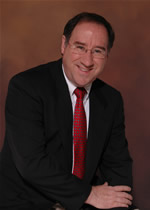 BIO: Grayson Randall is very active in IEEE including Future Directions and Public Safety initiatives. He serves as the Operations Lead for the IEEE-USA MOVE Community Outreach Program, providing power and communications at disasters (move.ieeeusa.org). He partners with the NC state emergency response team and other disaster relief organizations. He is a Life Member of the Vestal, NY Fire Department.
BIO: Grayson Randall is very active in IEEE including Future Directions and Public Safety initiatives. He serves as the Operations Lead for the IEEE-USA MOVE Community Outreach Program, providing power and communications at disasters (move.ieeeusa.org). He partners with the NC state emergency response team and other disaster relief organizations. He is a Life Member of the Vestal, NY Fire Department.
Mr. Randall is known in the world of robotics for his leadership of the Insight Racing DARPA Grand Challenge team which boasts final and semi-final positions in the highly competitive international autonomous robotic vehicle races. Mr. Randall serves as Vice President & Chief Technology Officer at Ascot Technologies, Inc., an award-winning software company. A former IBMer with 13 patents, he has over 40 years of experience in systems design and architecture.
Panel 6: Roadmaps and Standards
Public safety emergency management principles include a whole community approach for the preservation of life, health and property across geographies, ecosystems and underlying infrastructures. The public safety landscape is constantly evolving due to varying environmental, technological, social, and geopolitical drivers. Public safety scenarios include cybersecurity, electrical grid protection, emergency medical services, fire management, law enforcement, public health, search and rescue, tactical services, and much more. New and enhanced capabilities become essential to extend the range and depth of the public safety services for mission areas that extend across multiple jurisdictions. They include next-generation communication networks, advanced technologies, enablers, applications and services, and data governance, This panel discussion will explore various technology roadmaps, standards, and initiatives to meet the dynamic needs across the public safety ecosystem.
MODERATOR: Fawzi Behmann, President, TelNet Management Consulting Inc.
PANELISTS
- Dr. Frederica Darema, President and CEO of the InfoSymbiotic Systems Society
- Ramesh Gupta, VP of Network Engineering and Operations, Ligado Networks
- Timothy Lee, Boeing Technical Fellow
- Narendra Mangra, Principal at GlobeNet LLC
- Chuck Shaughnessy, Executive Advisor, Public Safety Communications Technology, First Responder Network Authority
- Tracy van Brakle – Testbeds, Lead Member of Technical Staff, AT&T
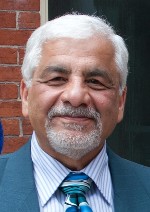 BIO: Fawzi Behmann is a visionary, thought leader, author, and entrepreneur in communications and networking technologies. He is the founder and president of TelNet Management Consulting Inc. offering professional services in technology and business trends, including positioning and adoption of IoT/5G/AI and development of smart networking solutions in key markets such as healthcare, mobility, energy, public safety, and smart cities.
BIO: Fawzi Behmann is a visionary, thought leader, author, and entrepreneur in communications and networking technologies. He is the founder and president of TelNet Management Consulting Inc. offering professional services in technology and business trends, including positioning and adoption of IoT/5G/AI and development of smart networking solutions in key markets such as healthcare, mobility, energy, public safety, and smart cities.
Fawzi is a distinguished Lecturer and keynote speaker at national and international conferences, and has several publications, including co-authoring a book on Collaborative Internet of Things. He is a Co-founder of the “IoT in Healthcare Consortium” of Intelligent Health Association, member of IEEE-HKN and serves as a lecturer at Texas State School of Engineering – Capstone Senior Design program.
Prior, Fawzi has held executive and leadership positions in communications and networking with Tier 1 companies in Canada and the US. He was the chief architect for development of Telecom Network Management systems for global carrier, Senior Manager for Network edge/core product releases and director of strategic marketing for SoC semiconductor product lines.
Volunteering at IEEE, Fawzi was appointed on IEEE Conference Committee (2022-2024). Fawzi is appointed as the Director of ComSoc Industry Outreach (2024-2025) and BoG member, and Chair of IEEE Future Networks Technical Community (2024-2025) serving 9 societies, conferences (e.g. FNWF) and roadmap (e.g. INGR). Prior, Fawzi was appointed as ComSoc Director for North America and BoG member serving 10,000 members and 95 chapters (2020-2021, 2022-2023).
Fawzi has received multiple awards for his professional leadership, including the IEEE USA professional leadership award, IEEE Communications Society NAB Exceptional Service Award, and IEEE ComSoc Chapter of the Year and Chapter Achievement Awards, CEO Diamond chip award among others. He holds an MBA, master’s in computer science, and bachelor’s in science with Honors in Mathematics with Distinction.
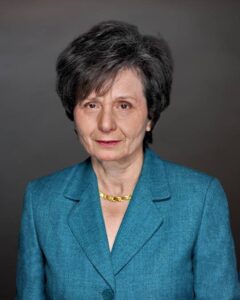 BIO: Dr. Frederica Darema is the President and CEO of the InfoSymbiotic Systems Society. In 2019, she retired as Senior Executive Service (SES) member and as Director of the Air Force Office of Scientific Research, in Arlington, Virginia, where she led the entire basic research investment for the AF, on science and technology for future AF capabilities and transitioning the discoveries to defense industries & the broader commercial sector; she also served in the Office of the Secretary of the Air Force, as Research Director in the Air Force’s Chief Data Office, and as Associate Deputy Assistant Secretary the Air Force Office for Science, Technology, and Engineering.
BIO: Dr. Frederica Darema is the President and CEO of the InfoSymbiotic Systems Society. In 2019, she retired as Senior Executive Service (SES) member and as Director of the Air Force Office of Scientific Research, in Arlington, Virginia, where she led the entire basic research investment for the AF, on science and technology for future AF capabilities and transitioning the discoveries to defense industries & the broader commercial sector; she also served in the Office of the Secretary of the Air Force, as Research Director in the Air Force’s Chief Data Office, and as Associate Deputy Assistant Secretary the Air Force Office for Science, Technology, and Engineering.
Prior career history includes Research Staff positions at the University of Pittsburgh, Brookhaven National Laboratory, and Schlumberger-Doll; and management and executive-level positions at: the T.J.Watson IBM Research Center and the IBM Corporate Strategy Group; the National Science Foundation and the Defense Advanced Research Projects Agency; and Director of the AFOSR Directorate for Information, Math, and Life Sciences.
Dr. Darema, PhD in Nuclear Physics, is a graduate of the University of Athens, Greece (BS), the Illinois Institute of Technology (MS), and University of California at Davis (PhD), and was a Fulbright Scholar and a Distinguished Scholar. She is a Life Fellow of the IEEE (Institute of Electrical and Electronics Engineers) and Fellow of the World Academy of Arts and Sciences (WAAS), among other professional recognitions. She has made seminal contributions in the supercomputing field, including: proposing SPMD, the predominant computational model for parallel computing for the last 40 years now; methods for performance engineering parallel and distributed systems; in 1980 she pioneered the DDDAS paradigm and since 2000 she has organized and led research initiatives, programs, workshops, conferences, and other forums to foster and promote DDDAS-based science and technology advances, showing the increasing importance throughout the years.
Presently she serves as an advisory Board Member for the College of Computing at the Illinois Institute of Technology; Advisory Board Member for the Center for Intelligent Energy Systems (CiENS) at Purdue University; Advisory Board Member of the University of California Department of Physics and Astronomy; member and contributor to the IEEE International Network Generations Roadmap (INGR); co-editor of a book-series on DDDAS/InfoSymbiotic Systems S&T, by Springer Publications.
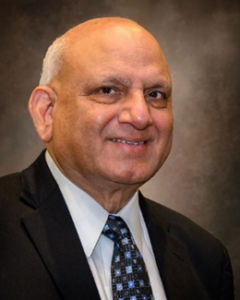 BIO: Ramesh Gupta is VP of Network Engineering and Operations at Ligado Networks working on 5G/ NTN and advanced integrated satellite/ terrestrial networks. His research work has included development of MMICs and their applications to active phased array antennas, critical for reconfigurable and narrow beam satellite architectures. He serves as a member of the IEEE MTT-S Adcom and has been responsible for initiating several successful initiatives as IEEE MTT-S Education Committee Chair (2014-2018) and as Marketing and Communications Committee (MarCom) Chair (2019-2021). He was recipient of IEEE MTT-S 2023 N. Walter Cox award.
BIO: Ramesh Gupta is VP of Network Engineering and Operations at Ligado Networks working on 5G/ NTN and advanced integrated satellite/ terrestrial networks. His research work has included development of MMICs and their applications to active phased array antennas, critical for reconfigurable and narrow beam satellite architectures. He serves as a member of the IEEE MTT-S Adcom and has been responsible for initiating several successful initiatives as IEEE MTT-S Education Committee Chair (2014-2018) and as Marketing and Communications Committee (MarCom) Chair (2019-2021). He was recipient of IEEE MTT-S 2023 N. Walter Cox award.
He has received many honors and awards including the 1994 COMSAT Laboratories’ Research Award. He was co-recipient of the Best Paper Awards at the 1992 International Digital Satellites Communications Conference, Denmark and 2011 AIAA Satellite Systems Conference, Japan. He received 2012 Joseph Wharton Award from the Wharton DC Club for his career contributions. He currently serves as Vice-Chair of the INGR mm-Wave and Signal Processing (SP) Working Group as a part of IEEE Future Networks Technical Community.
 BIO: Timothy Lee, a Boeing Technical Fellow based in Southern CA, leads the development of disruptive microelectronics technologies for advanced communications networks and sensor systems for airborne and space applications. His current research interests include silicon Application Specific Integrated Circuits (ASICs), gallium nitride Monolithic Microwave Integrated Circuits (MMICs), and 3DIC technologies for vertical integration of digital Si chiplets and analog/RF devices. He led the development of hardware for satellite communications and has built phased-array antenna electronics for commercial and US government customers.
BIO: Timothy Lee, a Boeing Technical Fellow based in Southern CA, leads the development of disruptive microelectronics technologies for advanced communications networks and sensor systems for airborne and space applications. His current research interests include silicon Application Specific Integrated Circuits (ASICs), gallium nitride Monolithic Microwave Integrated Circuits (MMICs), and 3DIC technologies for vertical integration of digital Si chiplets and analog/RF devices. He led the development of hardware for satellite communications and has built phased-array antenna electronics for commercial and US government customers.
He is an active volunteer in the IEEE. He is the 2024 IEEE-USA President-Elect and is seeking collaboration on semiconductor WFD. He leads several Technical Working Groups in the IEEE Heterogeneous Integration Roadmap (HIR) and the IEEE Future Networks Technical Community. He is a member of the IEEE Humanitarian Technology Board Events Committee and the IEEE TAB Adhoc on Data Strategies. Previous roles include membership in the IEEE Board of Directors (2021-2022) and past president of the IEEE Microwave Theory and Technology Society (MTT-S).
 BIO: Narendra Mangra provides advisory and consulting services across industry, government, and academia at GlobeNet LLC. His experience spans technical and leadership roles across the end-to-end mobile ecosystem functions from radio access networks (RAN) to international roaming, mobile network deployment life cycle from RAN planning to transition / decommissioning, solicitation development lifecycle from RFI to award selection, and program management lifecycle from new project initiation to project portfolio management. His diverse background enabled the development of a structured transdisciplinary framework for integrated ecosystems, networks, and governance functions to address complex scenarios. His public safety background includes the FirstNet nationwide public safety broadband network (NPSBN) requirements analysis and solicitation development, 800 MHz spectrum rebanding, shared regional microwave network policy development framework, and P25 network assessments.
BIO: Narendra Mangra provides advisory and consulting services across industry, government, and academia at GlobeNet LLC. His experience spans technical and leadership roles across the end-to-end mobile ecosystem functions from radio access networks (RAN) to international roaming, mobile network deployment life cycle from RAN planning to transition / decommissioning, solicitation development lifecycle from RFI to award selection, and program management lifecycle from new project initiation to project portfolio management. His diverse background enabled the development of a structured transdisciplinary framework for integrated ecosystems, networks, and governance functions to address complex scenarios. His public safety background includes the FirstNet nationwide public safety broadband network (NPSBN) requirements analysis and solicitation development, 800 MHz spectrum rebanding, shared regional microwave network policy development framework, and P25 network assessments.
Mangra also teaches at George Mason University and is the Co-Chair for several IEEE and IEEE SA activities, such as the International Network Generations Roadmap (INGR), Applications and Services Working Group, P1950.1 Smart Cities Framework and Architecture, Telehealth Industry Connections (IC), Transdisciplinary Framework IC. He also serves as the Technical Committee Area Co-Chair for the IEEE Public Safety Technology Initiative. His interests include comprehensive transdisciplinary framework development for complex scenarios, 5G and future networks, smart communities, and related ecosystems such as agriculture, public safety, and telehealth.
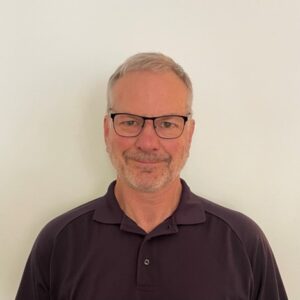 BIO: Chuck Shaughnessy has spent 30 years advancing communications for public safety. Since 2014, he has served as an executive advisor to the First Responder Network Authority’s Chief Network and Technology Officer. In this role, he has supported the Nationwide Public Safety Broadband Network contract, from the early days of Request for Proposal development to contract execution. Prior to his work with the FirstNet Authority, Chuck served as the VP of Operations for Harris Corporation (and its predecessor companies M/A-COM, Ericsson, and GE) in the land mobile radio sector. He has an MS in Electrical Engineering from SUNY Binghamton and a bachelor’s degree in electrical Engineer from Ga Tech.
BIO: Chuck Shaughnessy has spent 30 years advancing communications for public safety. Since 2014, he has served as an executive advisor to the First Responder Network Authority’s Chief Network and Technology Officer. In this role, he has supported the Nationwide Public Safety Broadband Network contract, from the early days of Request for Proposal development to contract execution. Prior to his work with the FirstNet Authority, Chuck served as the VP of Operations for Harris Corporation (and its predecessor companies M/A-COM, Ericsson, and GE) in the land mobile radio sector. He has an MS in Electrical Engineering from SUNY Binghamton and a bachelor’s degree in electrical Engineer from Ga Tech.
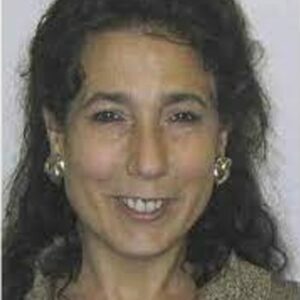 BIO: Tracy van Brakle is a Member of Technical Staff within AT&T Labs Wireless Technologies / Network Automation and Analytics group, and is also a co-chair and/or contributor within several open source projects and standards development organizations. Her current area of interest is integrating Open RAN technologies with open platforms, e.g., LFN 5G SBP, ETSI NFV MANO, using model-driven interface specifications from O-RAN and 3GPP. Before joining AT&T, Tracy was a Senior Technologist with Goldman Sachs. She holds 17 active US patents in Wireless Technologies.
BIO: Tracy van Brakle is a Member of Technical Staff within AT&T Labs Wireless Technologies / Network Automation and Analytics group, and is also a co-chair and/or contributor within several open source projects and standards development organizations. Her current area of interest is integrating Open RAN technologies with open platforms, e.g., LFN 5G SBP, ETSI NFV MANO, using model-driven interface specifications from O-RAN and 3GPP. Before joining AT&T, Tracy was a Senior Technologist with Goldman Sachs. She holds 17 active US patents in Wireless Technologies.
Focus area: Meeting functional and security requirements of military missions and civilian first responder teams in near real-time through a system-of-systems/network-of-networks (JADC2) approach across (1) Planning and Composition, (2) Interoperability, and (3) Execution. This integrates a novel Artificial Intelligence Planner with an open-source Service Management & Orchestration Framework and RAN Intelligent Controllers.
